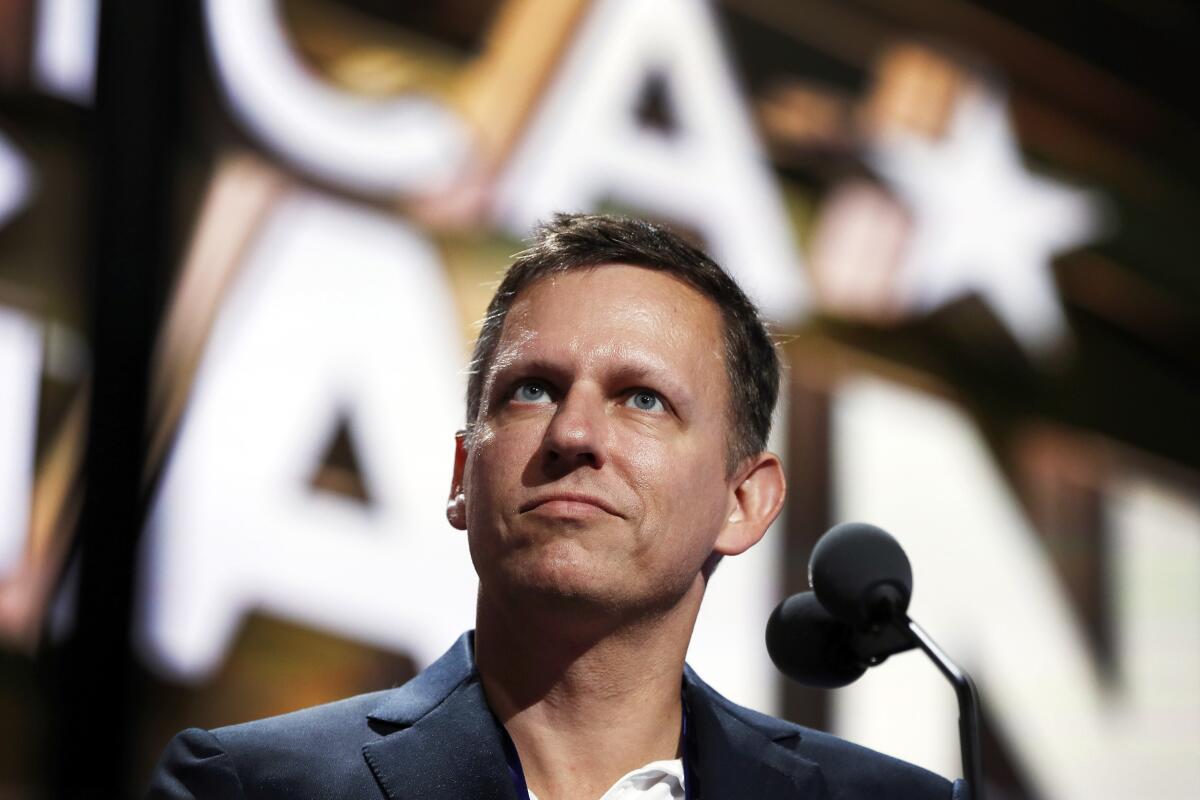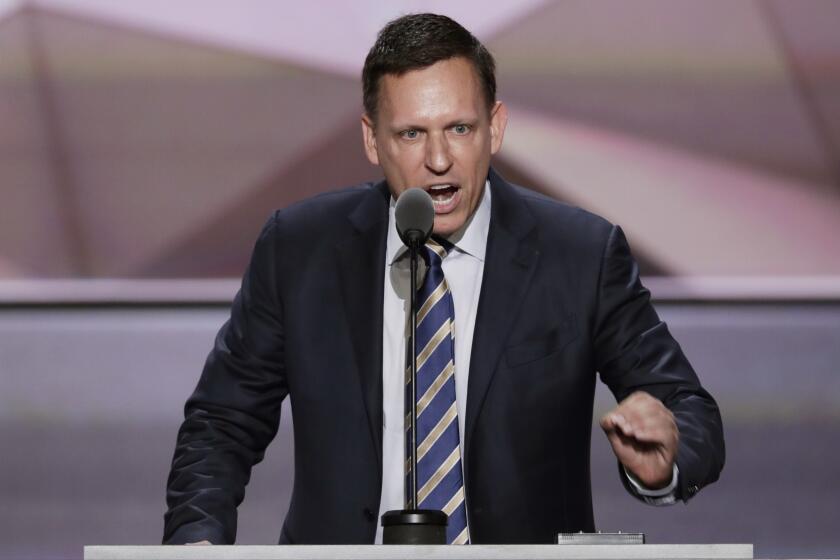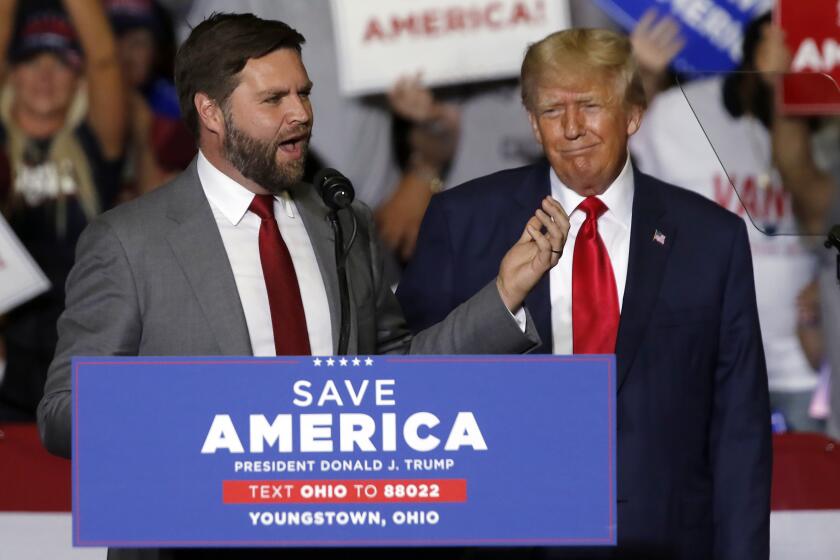Column: Why is Peter Thiel, a GOP megadonor, pursuing a Maltese passport?

“The elites plunder this country and then blame us for it in the process,” J.D. Vance, Republican candidate for the U.S. Senate, declared when he announced his bid for the seat from Ohio.
Elsewhere, he’s insisted that America faces a stark choice. “We can have an American republic or a global oligarchy, and it’s time for choosing.”
Blake Masters, Arizona’s Republican Senate candidate, shares a similar worldview. In his victory speech after winning the GOP nomination in August he said that a liberal cabal runs the “newspapers and television and schools and universities — and you better believe they control Big Tech, too.” In an earlier interview, he explained that progressives not only hate America and Americans who disagree with them, but also the “very idea of a sovereign nation.” If their view “takes root and becomes universal,” this “globalist ideology,” he said, will lead to a “One World State, call it ‘Global Communism.’” He added, “So in my view that ideology is a pretty good candidate for the Antichrist.”
The billionaire investor is stepping down from Facebook’s board and escalating his political activity on behalf of Donald Trump-aligned candidates.
These men have much in common ideologically and politically. They also share a patron: Peter Thiel, the billionaire tech entrepreneur and investor who co-founded PayPal and provided the first outside investment in Facebook. Indeed, both worked for Thiel before getting into politics, with Thiel’s financial support.
On Friday, the New York Times reported that Thiel is in the process of buying a Maltese passport. If successful, Malta will be the fourth country Thiel can claim citizenship in. Born in Germany, he has dual U.S. and German citizenship. In 2011, he acquired a New Zealand passport. In his application, he wrote that there is “no other country that aligns more with my view of the future than New Zealand.” Take that Americans, Germans and Maltese.
Thiel is also a big champion of “seasteading,” the intriguing project of building artificial island-cities in international waters that would be sovereign nations outside the existing global order. If successful, such floating principalities would finally take the phrase “rootless cosmopolitans” from the figurative to the literal.
Defenders and critics alike believe that Thiel, a master of portfolio management, is simply hedging his bets. If the globalist progressive antichrists win here, he’s got someplace to go. As the New York Times notes, the uber-rich buy Maltese passports as a “hedge against social or political turmoil at home.”
While I don’t think much of this can be fairly described as particularly “patriotic,” I’d normally say that’s fine.
You might think J.D. Vance, the Trump-endorsed author in the U.S. Senate race in Ohio, would be well ahead of Democrat Tim Ryan. But the race is tight, polls show.
Yet there’s just something weird about a billionaire libertarian with multiple passports — and a work-in-progress billet on a floating city — who made his money in Big Tech funding “nationalist” candidates who rail against globalist elites.
But what really bothers me about Thiel’s approach to American politics isn’t hypocrisy, it’s the technocratic arrogance of it all. Like a lot of Silicon Valley billionaire capitalists, he thinks there’s a transitive property to his brilliance that makes him smarter about politics than everyone else, despite the fact that he’s repeatedly misread the data. He sees politics — and even nationality — as an engineering puzzle that can be solved with clever hacks. Specifically, all you have to do is fuel populist hysteria on the right.
If you clear away the bull of Vance‘s and Masters’ rhetoric (bring a shovel), the basic argument is that “elites” are a monolithic bloc of overlords. Never mind that both Masters (who has a bachelor’s and a law degree from Stanford) and Vance (a law degree from Yale) are elites by any objective definition and Thiel is a member of the Olympian elite. Of course, nearly all the Republican politicians — and some Democrats — who attack elites are elites, too. What these politicians really mean is that they want to be the elites running things.
Of course, politics is always and everywhere a contest between elites for power and influence. What’s annoying about Thiel’s approach is that he finds it necessary to back ideas he doesn’t actually support — or live by — in a cynical bid for power.
Thiel wants an escape plan if America falls apart, threatening his wealth — most of which is in an ingeniously structured Roth IRA. Well, Vance has taken the position that the U.S. government should “seize the assets” of ideological enemies that lawfully exploit tax laws to amass wealth. Bizarrely, Vance seems to think such an unconstitutional idea would never be weaponized against ideological friends when the antichrists are in charge. Masters opposes gay marriage, but not so much that he declined an invitation to attend Thiel’s wedding.
Maybe if Thiel patriotically resigned himself to living in this country even if the heavens should fall, he’d do better due diligence to protect his actual interests.
More to Read
A cure for the common opinion
Get thought-provoking perspectives with our weekly newsletter.
You may occasionally receive promotional content from the Los Angeles Times.













